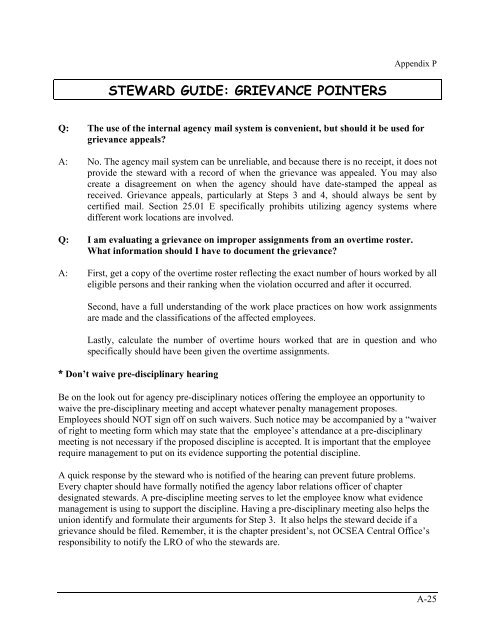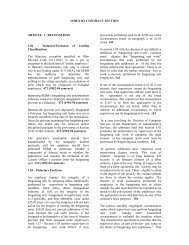Download the Grievance Guide - OCSEA
Download the Grievance Guide - OCSEA
Download the Grievance Guide - OCSEA
You also want an ePaper? Increase the reach of your titles
YUMPU automatically turns print PDFs into web optimized ePapers that Google loves.
Appendix P<br />
STEWARD GUIDE: GRIEVANCE POINTERS<br />
Q: The use of <strong>the</strong> internal agency mail system is convenient, but should it be used for<br />
grievance appeals?<br />
A: No. The agency mail system can be unreliable, and because <strong>the</strong>re is no receipt, it does not<br />
provide <strong>the</strong> steward with a record of when <strong>the</strong> grievance was appealed. You may also<br />
create a disagreement on when <strong>the</strong> agency should have date-stamped <strong>the</strong> appeal as<br />
received. <strong>Grievance</strong> appeals, particularly at Steps 3 and 4, should always be sent by<br />
certified mail. Section 25.01 E specifically prohibits utilizing agency systems where<br />
different work locations are involved.<br />
Q: I am evaluating a grievance on improper assignments from an overtime roster.<br />
What information should I have to document <strong>the</strong> grievance?<br />
A: First, get a copy of <strong>the</strong> overtime roster reflecting <strong>the</strong> exact number of hours worked by all<br />
eligible persons and <strong>the</strong>ir ranking when <strong>the</strong> violation occurred and after it occurred.<br />
Second, have a full understanding of <strong>the</strong> work place practices on how work assignments<br />
are made and <strong>the</strong> classifications of <strong>the</strong> affected employees.<br />
Lastly, calculate <strong>the</strong> number of overtime hours worked that are in question and who<br />
specifically should have been given <strong>the</strong> overtime assignments.<br />
* Don’t waive pre-disciplinary hearing<br />
Be on <strong>the</strong> look out for agency pre-disciplinary notices offering <strong>the</strong> employee an opportunity to<br />
waive <strong>the</strong> pre-disciplinary meeting and accept whatever penalty management proposes.<br />
Employees should NOT sign off on such waivers. Such notice may be accompanied by a “waiver<br />
of right to meeting form which may state that <strong>the</strong> employee’s attendance at a pre-disciplinary<br />
meeting is not necessary if <strong>the</strong> proposed discipline is accepted. It is important that <strong>the</strong> employee<br />
require management to put on its evidence supporting <strong>the</strong> potential discipline.<br />
A quick response by <strong>the</strong> steward who is notified of <strong>the</strong> hearing can prevent future problems.<br />
Every chapter should have formally notified <strong>the</strong> agency labor relations officer of chapter<br />
designated stewards. A pre-discipline meeting serves to let <strong>the</strong> employee know what evidence<br />
management is using to support <strong>the</strong> discipline. Having a pre-disciplinary meeting also helps <strong>the</strong><br />
union identify and formulate <strong>the</strong>ir arguments for Step 3. It also helps <strong>the</strong> steward decide if a<br />
grievance should be filed. Remember, it is <strong>the</strong> chapter president’s, not <strong>OCSEA</strong> Central Office’s<br />
responsibility to notify <strong>the</strong> LRO of who <strong>the</strong> stewards are.<br />
A-25

















